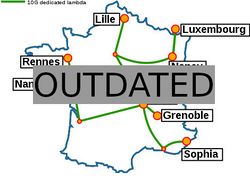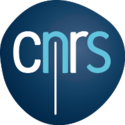Grid5000:Home: Difference between revisions
No edit summary |
No edit summary |
||
| Line 27: | Line 27: | ||
<br> | <br> | ||
{{#status:0|0|0|http://bugzilla.grid5000.fr/status/upcoming.json}} | {{#status:0|0|0|http://bugzilla.grid5000.fr/status/upcoming.json}} | ||
<br> | |||
{{#publications:}} | {{#publications:}} | ||
Revision as of 11:17, 23 March 2018
|
Grid'5000 is a large-scale and versatile testbed for experiment-driven research in all areas of computer science, with a focus on parallel and distributed computing including Cloud, HPC and Big Data. Key features:
|
Five random publications that benefited from Grid'5000 (at least 2517 overall):
- Anna Mossolova, Kamel Smaïli. The only chance to understand: machine translation of the severely endangered low-resource languages of Eurasia. The Fifth Workshop on Technologies for Machine Translation of Low-Resource Languages (LoResMT), COLING 2022, Oct 2022, Gyeongju, South Korea. hal-03774644 view on HAL pdf
- Cyrille Bonamy, Laurent Bourgès, Laurent Lefèvre. Impact des langages de programmation sur la performance énergétique des applications de calcul scientifique : un challenge ?. JRES 2022 - Journées Réseau de l’Enseignement et de la Recherche, RENATER, May 2022, Marseille, France. hal-03607468 view on HAL pdf
- Patrick Saux, Odalric-Ambrym Maillard. Risk-aware linear bandits with convex loss. European Workshop on Reinforcement Learning, Sep 2022, Milan, Italy. hal-03776680 view on HAL pdf
- Virginie Lallemand, Marine Minier, Loïc Rouquette. Automatic Search of Rectangle Attacks on Feistel Ciphers: Application to WARP. IACR Transactions on Symmetric Cryptology, 2022, 2022 (2), pp.113-140. 10.46586/tosc.v2022.i2.113-140. hal-03760280 view on HAL pdf
- Yasmina Bouizem. Fault tolerance in FaaS environments. Other cs.OH. Université Rennes 1, 2022. English. NNT : 2022REN1S036. tel-03882666 view on HAL pdf
Latest news
Failed to load RSS feed from https://www.grid5000.fr/mediawiki/index.php?title=News&action=feed&feed=atom: Error parsing XML for RSS
Grid'5000 sites
Current funding
As from June 2008, Inria is the main contributor to Grid'5000 funding.
INRIA |
CNRS |
UniversitiesUniversité Grenoble Alpes, Grenoble INP |
Regional councilsAquitaine |


